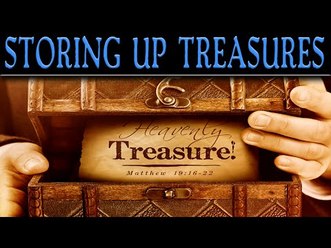
Matthew 6:19-21 NIV “Do not store up for yourselves treasures on earth, where moths and vermin destroy, and where thieves break in and steal. But store up for yourselves treasures in heaven, where moths and vermin do not destroy, and where thieves do not break in and steal. For where your treasure is, there your heart will be also.
1 Corinthians 3:5-6, 8-9 NIV The Apostle Paul later said that there are rewards in storing up treasures in heaven.What, after all, is Apollos? And what is Paul? Only servants, through whom you came to believe—as the Lord has assigned to each his task. I planted the seed, Apollos watered it, but God has been making it grow. The one who plants and the one who waters have one purpose, and they will each be rewarded according to their own labor. For we are co-workers in God’s service; you are God’s field, God’s building.
Billy Graham in his book Where I Am – Heaven, Eternity, and the Life Beyond Now tells us how we can store up treasures in heaven.
Eternal Rewards – Winning His Favor
You can be sure that anyone who gives up home or brothers or sisters or mother or father or children or land for me and for the good news will be rewarded. . . . And in the world to come, they will have eternal life.
— Mark 10:29–30 CEV
A gift is freely given; rewards are earned. The Bible speaks of both: gifts certainly, but also prizes and crowns. God has promised eternal rewards to those who serve Him faithfully. He has told us to store our riches where there is no corruption— in Heaven.
Receiving God’s gift of salvation is what should make us want to live for Him. We cannot buy salvation, but by living a life of undivided devotion, we can “find favor and high esteem / In the sight of God” (Proverbs 3:4). The Bible says, “Without faith it is impossible to please Him” and that “He is a rewarder of those who diligently seek Him” (Hebrews 11:6).
There were two old friends who were both dying. One was rich, the other poor. The rich man was not a Christian, but the poor man was a very strong believer in Christ. The rich man said to a visitor one day, “When I die, I shall have to leave my riches.” Then he pointed to his dying friend and said, “And when he dies, he will go to his riches.”
In a couple of sentences the rich man summed up a stark contrast between them. The man who possessed everything on earth in reality had nothing. The man with nothing on earth in reality had everything. This is a vivid illustration of what Jesus said to His disciples:
“Do not lay up for yourselves treasures on earth, where moth and rust destroy . . . but lay up for yourselves treasures in heaven. . . . For where your treasure is, there your heart will be also.” (Matthew 6:19–21)
Does that mean that we must renounce everything we own? No— not unless God clearly commands us to do so. But it does mean we commit everything we have— including our lives— to Christ. We are to put our love for Him above everything else.
Many years ago, back in the 1880s, the famous preacher Dwight L. Moody felt God leading him to hold an evangelistic meeting at Cambridge University. Many said it was a futile task. He went anyway, and people sneered at his effort. Halfway through the series of meetings, though, things turned around and many responded to the invitation. Hundreds more surrendered their lives in service to God. Moody was storing up treasures in Heaven.
Out of this mission came the famous Cambridge Seven, seven young men who joined Hudson Taylor’s China Inland Mission. One of them was C. T. Studd, the son of a wealthy man and captain of the prestigious Cambridge University cricket team, who sensed God’s call to missionary work in China.
At the age of twenty- five, the young man inherited a fortune from his father’s estate. He promptly gave it all away to Christian work, keeping nothing for himself— not even for his own work in Asia. Then at the age of fifty and in poor health after years in China and India, he felt God’s call to take the Gospel to Africa. After his first visit he wrote:
Last June at the mouth of the Congo there awaited a thousand prospectors, traders, merchants and gold seekers, waiting to rush into these regions as soon as the government opened the door to them, for rumor declared that there is an abundance of gold. If such men hear so loudly the call of gold and obey it, can it be that the ears of Christ’s soldiers are deaf to the call of God, and the cries of the dying souls of men? Are gamblers for gold so many, and risk takers so few for God?
Studd is just one of multitudes of people who have surrendered their lives to Christ and walked away from lucrative businesses, successful jobs, and easygoing lifestyles to serve Him in difficult places.

Borden had stored up treasure in Heaven that far exceeded the vast wealth he had given away on earth. Time revealed that his testimony had caused many others to serve God with their lives. Christ Himself “will reward each according to his works” (Matthew 16:27).
There is a group of men in Scripture who also walked away from their life’s work to follow Christ; many of them were fishermen from Galilee. The Gospels give us a wonderful glimpse into a conversation between Jesus and His disciples. Peter said, “See, we have left all and followed You” (Mark 10:28). Jesus knows the motives, thoughts, and intents of the heart. “I am He who searches the minds and hearts. And I will give to each one of you according to your works” (Revelation 2:23). So He understood exactly why Peter was making this point. Jesus answered him with reassurance:
“There is no one who has left house or brothers or sisters or father or mother or wife or children or lands, for My sake and the gospel’s, who shall not receive a hundredfold now in this time . . . and in the age to come, eternal life.” (Matthew 19:29–30)
He was telling Peter— and us— that He would provide and that all the sacrifice would be worth it.
While much is said about Christian workers who are publicly visible, not much is said anymore about the quiet works of God’s servants. We will have to get to Heaven before we will fully realize the army of prayer warriors that made others’ work possible. Just as the church is the body of Christ, the work is never accomplished by the act of just one, unless it is Christ’s alone. “For we are God’s fellow workers; you are God’s field, you are God’s building” (1 Corinthians 3:9).
This is what Paul explained to the church at Corinth when a controversy stirred up about who should get credit for works done in Jesus’ name. Some had come to know Christ by the works of Paul, Apollos, and others preaching the Gospel. Paul wrote to them that the Lord had given responsibilities to each one, but that the results belonged to Him (vv. 5–7).
In our crusades over the years, we have watched the body of Christ operating in various ways— churches recruiting volunteers to help with parking, ushering, counseling, giving financially, and, most important, praying for the lost. All of these who have quietly and faithfully worked behind the scenes will be rewarded by the Lord Himself someday.
There are those who minister to others by their presence in hospital waiting rooms and at funeral homes, when family and friends are in need and mourning loss. This used to be a wonderful ministry outreach but is less popular today. The Lord is watching those who are faithful in giving themselves and their time to bring comfort to those who need it. I think of my own mother, who was an avid letter writer, encouraging others with a word from Scripture. This, too, is service to God.
Then there are those who point people to the Savior by how they live, day in and day out. Parents who are faithful to each other and to their children, living examples who speak of Christ’s virtues, instilling Christian character into the fabric of life so that when they are with others, no one can find fault in how they live. Christ will reward them.
In all things showing yourself to be a pattern of good works; in doctrine showing integrity, reverence, incorruptibility, sound speech that cannot be condemned, that one who is an opponent may be ashamed, having nothing evil to say of you (Titus 2:7–8).
There are young people, too, who stand strong among their peers without compromise. They may be laughed at or worse because they won’t participate in dishonorable behavior. This pleases the Lord, and He will reward them because they honored him and exhibited a steadfast witness. “Therefore, my beloved brethren, be steadfast, immovable, always abounding in the work of the Lord, knowing that your labor is not in vain in the Lord” (1 Corinthians 15:58). Living obediently for the Lord is service to Him.
Most important, though, is that God tells us to store up the right kind of riches in our lives. We often think of riches in a monetary or materialistic way, but God speaks of riches that don’t fade away. He will deposit His riches in our hearts, creating an inward righteousness that produces the marks of a true believer in Christ (Ephesians 2:6–8).
When we possess the richness of salvation, our storehouse here will be full to overflowing with the fruit of the Spirit, unspeakable joy, peace that passes all understanding, wisdom, strength, and the love of Christ.
Someone has said that these are the beautiful jewels in heavenly crowns because they are the attributes of Christ.
In Heaven there will be many believers who never received any acknowledgment while on earth, yet they faithfully prayed and humbly served Christ. I believe their crowns may sparkle with more jewels than the philanthropist who endowed the church and whose name is engraved on the plaque in the narthex. Paul warned the wealthy not to be haughty, not to seek men’s approval, but God’s (Galatians 1:10).
Moses gave up all earthly glory and possessions to identify with God’s people. He was the adopted child of an Egyptian princess, but he gave up the kingdom and crown of Egypt to be a child of God. He was educated in the finest schools, but he gave up the prestige to learn the wisdom of God. Moses gave up the royal scepter to be rich in God’s law. The prophet was known as a shepherd, a leader, a deliverer, a lawgiver, and a judge. But Moses said, “O my Lord, I am . . . Your servant” (Exodus 4:10); and when he died, God spoke of him as, “Moses My servant” (Joshua 1:2).
When you reach Heaven, there will be no opportunity to brag of your exploits, your ambitions, or the joys of your pleasure; but you will have eternity to rejoice in how you lived your life for Jesus because of His grace in you.
It may take a lifetime to accumulate wealth, but it can vanish in the blink of an eye. While the Bible teaches us to store up treasures in Heaven, the greatest treasure is in knowing that we will be rewarded by His very presence— forevermore.
—Billy Graham, Where I Am – Heaven, Eternity, and the Life Beyond Now (2013)

 RSS Feed
RSS Feed